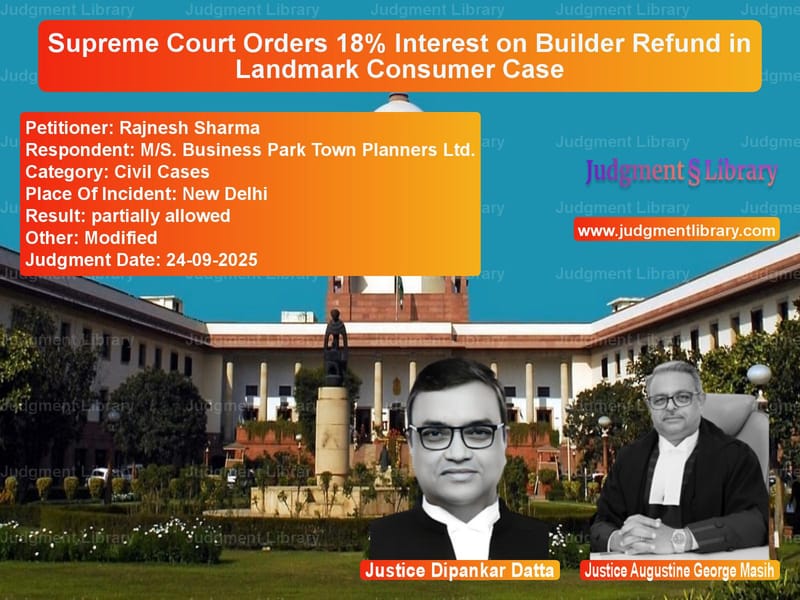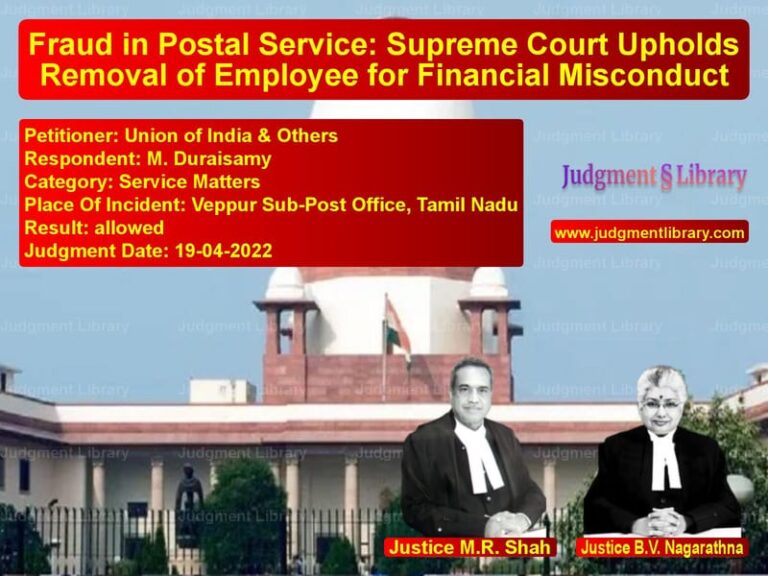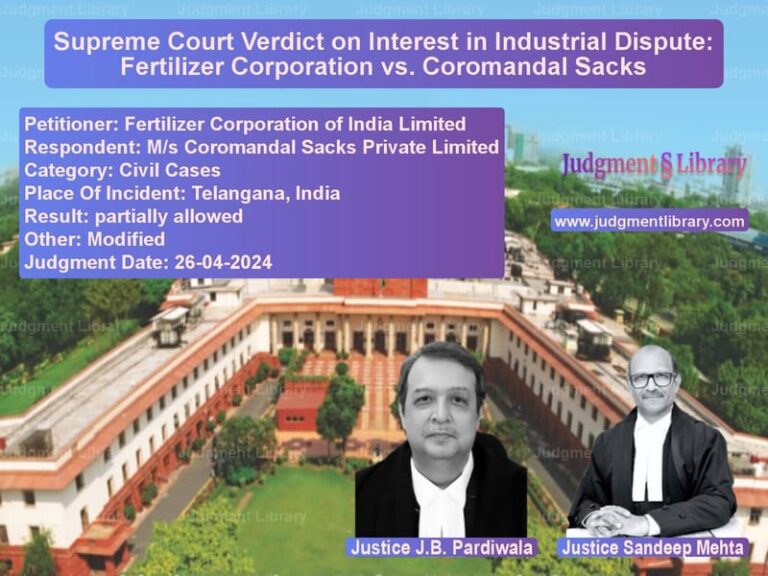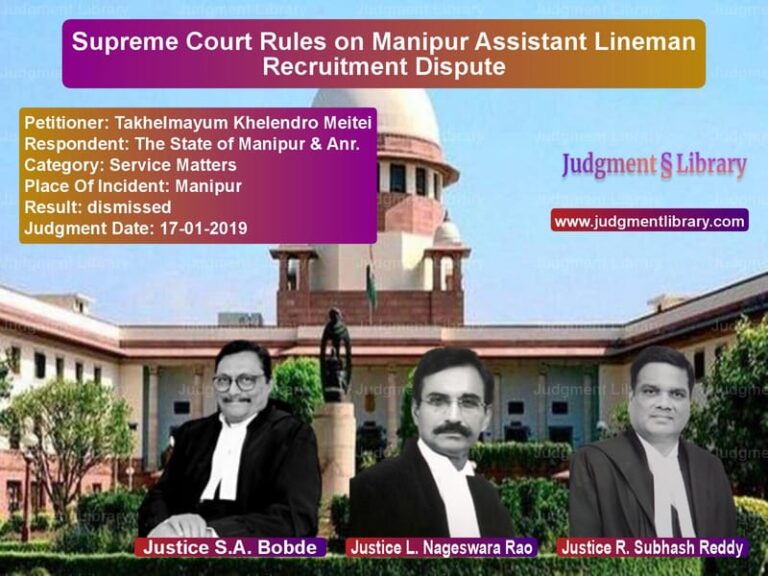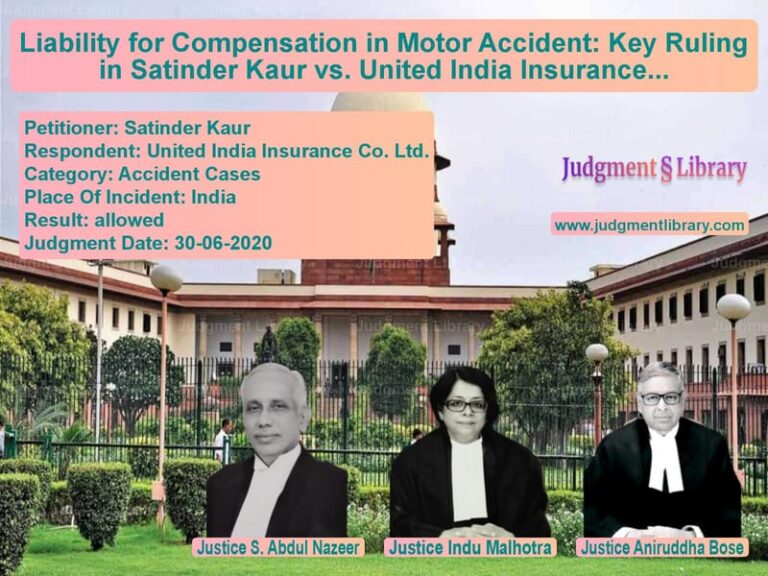Supreme Court Orders 18% Interest on Builder Refund in Landmark Consumer Case
In a significant victory for homebuyers and consumers across India, the Supreme Court has delivered a powerful judgment that establishes an important principle of fairness in builder-buyer agreements. The case involved Rajnesh Sharma, who had booked a plot in 2006 with M/s. Business Park Town Planners Ltd. for their project called Park Land, paying over Rs. 43 lakhs over the years, but never received possession despite waiting for more than a decade. What makes this case particularly noteworthy is the Court’s decision to apply the same interest rate to the builder’s default that the builder had imposed on the buyer for delayed payments – a clear message that fairness must work both ways in consumer contracts.
The dispute began when Sharma booked a plot on March 10, 2006, paying Rs. 7,86,218 as advance registration charges. The agreement specified that possession would be handed over within 24 months of sanction of service plans. However, years passed without any progress. In April 2011 – more than five years after the initial booking – the developer informed Sharma that due to changes in the layout plan, they were allotting an alternative plot and demanded an additional Rs. 2,30,784 since the new plot was 7 square yards larger. The buyer continued making payments as demanded, including an interest payment of Rs. 83,300.67 in March 2015 for alleged delayed payments.
After waiting patiently for over a decade, Sharma finally terminated the agreement in March 2017 and filed a consumer complaint before the National Consumer Disputes Redressal Commission (NCDRC) in April 2018. Interestingly, only after the complaint was filed did the builder offer possession in May 2018 – but demanded an additional Rs. 7,60,900.33, including various new charges that weren’t part of the original agreement. The NCDRC ordered the builder to refund the principal amount of Rs. 43,13,212 with simple interest at 9% per annum, which Sharma appealed to the Supreme Court as inadequate compensation for the builder’s twelve-year delay.
Read also: https://judgmentlibrary.com/supreme-court-upholds-landowner-rights-in-haryana-bachat-land-case/
The Buyer’s Arguments
Mr. Vivek Malik, learned counsel for the appellant, presented several compelling arguments. He contended that ‘the NCDRC erred in forcing upon the appellant refund of the principal amount paid by him with a meagre simple interest of 9% p.a.’ He emphasized that ‘the appellant paid a total sum of Rs. 43,13,313/-, in instalments, as and when demands were raised by the respondent. Despite booking the plot in the year 2006, the possession thereof was not delivered until 2018. In such view of the facts, interest @ 9% p.a. was insufficient causing huge loss to the appellant.’
Malik detailed various questionable charges imposed by the builder, noting that ‘various additional costs were wrongly charged by the respondent, because of which the appellant ended up paying Rs. 43,13,313/–, whereas the initial sale consideration was Rs. 36,03,692/–.’ He specifically challenged the enhanced EDC charges of Rs. 4,81,600, the interest demand of Rs. 83,300.67 without proper justification, and the new charges introduced in the 2018 possession offer including electricity and STP charges, GST on payments made before 2017, and unexplained increases in preferential location charges.
Perhaps the most compelling argument was about the fundamental unfairness: ‘the respondent charged the appellant interest @ 18% p.a. whereas agreed to give back to the appellant the principal amount with 9% interest, which is in defiance of logic and reason. Respondent, for its default, should have been judged by the same standard and made to pay back 18% interest.’
The Builder’s Defense
Mr. Nayyar, learned senior counsel for the respondent builder, mounted a vigorous defense with four key arguments. First, he contended that ‘for grant of relief under the Consumer Protection Act, 1986, it is imperative for the consumer to prove actual loss or injury to him due to neglect of the other party.’ He emphasized Section 14 of the Act which requires compensation for ‘any loss or injury suffered by the consumer due to the negligence of the opposite party,’ arguing that ‘evidence must be led to prove actual loss suffered by the consumer before the grant of compensation. Grant of compensation cannot be beyond actual loss and cannot venture into the territory of gain-based remedies.’
Second, Nayyar argued that ‘a consumer cannot, as a matter of routine, be awarded compensation at the rate charged by the builder under the contract. This Court has consistently granted a 9% interest rate to the consumers for deficiency in services.’ Third, he contended that ‘this Court has consistently rejected the claims of consumers who claimed parity with builders in the interest charged on delayed payments.’
The builder’s counsel relied heavily on precedent cases including IREO Grace Realtech v. Abhishek Khanna where the Court held that ‘we cannot accept the claim of the apartment buyers for payment of compound interest @ 20% p.a., which has no nexus with the commercial realities of the prevailing market.’ He also cited Kolkata West International City Pvt. Ltd. v. Devasis Rudra where the Court found a builder-buyer agreement to be one-sided but still reduced the interest rate from 12% to 9%.
Finally, Nayyar defended the various charges, arguing that the preferential location charge increase was justified because the alternative plot was on a wider road with commercial potential, the interest was only charged for the 2007-2011 period, and the other charges were contractually permissible.
The Court’s Reasoning and Landmark Ruling
The Supreme Court, in its judgment delivered by Justice Dipankar Datta, conducted a thorough analysis of the arguments and precedents. The Court first addressed the builder’s argument about consistent 9% awards, noting that ‘on perusal thereof, we find that in all such cases this Court did not give elaborate reasons for rejecting the claim for parity but reduced/increased the rate of interest based on other factors peculiar to the facts and circumstances of each case.’
The Court made a crucial observation: ‘Therefore, it cannot be said that this Court has always rejected the claim of parity. Suffice it to say, there is no principle of law that interest in default charged by the builder can never be granted to the buyer.’ The Court emphasized that ‘law is well settled that the amount of interest should be reasonable. What is reasonable varies from case to case. The same is to be granted considering the facts and circumstances of each case.’
The Court then examined the builder’s conduct in detail, particularly the 2011 alternative allotment under Clause 7 of the agreement, which allowed changes if ‘required by any statutory authority(s) of Govt.’ The Court noted that ‘during arguments, we enquired of Mr. Nayyar for the respondent to show the basis for invoking clause 7 of the AGREEMENT, i.e., to show us that the layout plan was sought to be changed by the government or statutory authority. In answer thereto, it was submitted that the alternative allotment was made in the year 2011; however, till 2018, the appellant raised no demur as regards the same. The answer is neither here nor there. Whether or not the appellant raised a demur is not relevant for validation of the respondent’s conduct.’
In its most significant passage, the Court declared: ‘Keeping in mind the overall conduct of the respondent: the delay caused by it in offering the plot, the fact that the respondent charged the appellant delay compensation @ 18% p.a. on the due amount, and the long wait that the appellant had to endure over a period of a decade, causing harassment and anxiety, which are writ large, we find that this is an appropriate case where refund of the principal amount with interest @ 9% p.a., as awarded by the NCDRC, will not serve the ends of justice.’
The Court delivered a powerful statement about fairness in consumer contracts: ‘In view of the conduct of the respondent, it cannot be permitted to escape with a nominal liability for its default, while it charged interest @ 18% on default committed by the appellant. Although, the rate of interest charged by the builder cannot be granted to the buyer as a rule of thumb, however, in the present case, equity and fairness demands that the respondent be put to the same rigours for charging 18% interest and face consequences similar to those imposed on the appellant for default committed by him. If we hold otherwise, we will be perpetuating a manifestly wrong bargain.’
The Court consequently ‘substitute[d] the rate of interest awarded by the NCDRC and increase[d] it from 9% to 18% per annum, while keeping the other terms intact,’ ordering the builder to refund the amount within two months.
This judgment represents a significant shift in the judicial approach to builder-buyer disputes, establishing that when builders impose harsh terms on buyers, they cannot complain when those same standards are applied to their own defaults. The principle of ‘what’s good for the goose is good for the gander’ has found strong judicial endorsement, providing homebuyers with stronger protection against arbitrary builder practices and delayed projects that have become all too common in India’s real estate sector.
Petitioner Name: Rajnesh Sharma.Respondent Name: M/S. Business Park Town Planners Ltd..Judgment By: Justice Dipankar Datta, Justice Augustine George Masih.Place Of Incident: New Delhi.Judgment Date: 24-09-2025.Result: partially allowed.
Don’t miss out on the full details! Download the complete judgment in PDF format below and gain valuable insights instantly!
Download Judgment: rajnesh-sharma-vs-ms.-business-park-t-supreme-court-of-india-judgment-dated-24-09-2025.pdf
Directly Download Judgment: Directly download this Judgment
See all petitions in Consumer Rights
See all petitions in Property Disputes
See all petitions in Compensation Disputes
See all petitions in Contract Disputes
See all petitions in Judgment by Dipankar Datta
See all petitions in Judgment by Augustine George Masih
See all petitions in partially allowed
See all petitions in Modified
See all petitions in supreme court of India judgments September 2025
See all petitions in 2025 judgments
See all posts in Civil Cases Category
See all allowed petitions in Civil Cases Category
See all Dismissed petitions in Civil Cases Category
See all partially allowed petitions in Civil Cases Category

